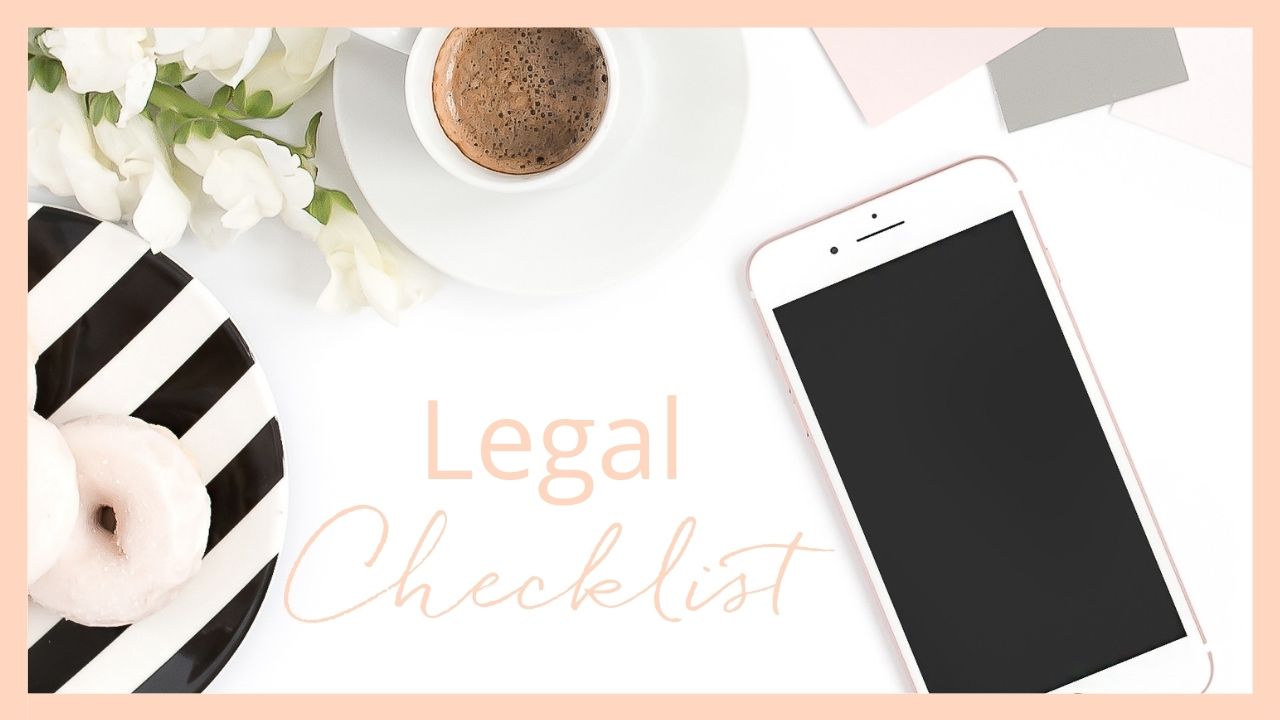The health coaching and wellness industry is a multi-billion dollar industry, growing rapidly every year. More and more adults are turning to health coaches, independent wellness experts, homeopathic remedies, and trainers to take control of their health, well-being, mindset, and fitness. Throughout my career thus far as a legal expert in the coaching field, I have been able to help hundreds of health professionals legally protect their businesses, and learn the boundaries and parameters of what they CAN and CAN’T do.
Plus (fun fact!) I used to BE a certified health coach as a part-time side hustle, when I was working as a corporate attorney. (It’s amazing what you can accomplish in your 20’s before you have kids).
So whether you’re just starting out, have a few consistent clients, or run a 6 or 7-figure empire, there are the SAME legal requirements in place, and the same issues for not creating a legally compliant, legally sound business. In my opinion, the BEST time to get these things in place is the beginning – set a strong foundation, and watch it grow as a stable, compliant, reliable business…not the house of cards that may come crashing down at any moment, with a lawsuit, FTC fine, or other penalty.
HERE are my top 5 Legal MUSTS for Wellness Professionals:
- Get the right documents on your website
Creating and launching a website is becoming easier and easier. And with the rise of digital businesses, virtually ALL businesses have a website or some kind of digital component, even if there’s also a brick and mortar store or studio. While it may be easy to create and publish a website, don’t forget, there are also a few CRUCIAL things to have in place legally, to make sure your site is compliant with privacy laws, and protected from reader lawsuits:
- PRIVACY POLICY
Once you hit *publish* on your website, and start collecting ANY kind of data or information, a complete, internationally-compliant privacy policy is legally required to be in the footer of your website. So what is it?? A privacy policy is where you will tell your website visitors, and anyone who may give you their name, email, or contact information, exactly what information you collect from your website (including things like Google Analytics, Facebook pixel tracking, Cookies, etc.) how you use it, how you store it, whether you share their information, and how they can be removed from your email list / database.
YES it is a legal-heavy document, and may seem boring to you. BUT, with the increase in consumer data awareness, and a general desire to know how our information is being used and shared online, your consumers will WANT this information on your site. Plus, the FTC legally requires it, AND dishes out some pretty heavy 6 and even 7-figure fines for failing to have this on your website.
So how do you go about finding one, and where does it go? Sure, you can find them for free online. However – my theory on this is that you get what you pay for. Free privacy policy services likely do NOT provide the correct information you need in your privacy policy in order to run an online business that is internationally compliant. You can also hire a data privacy attorney to draft one for you, which will run you about $1,000-$1,500 or more. OR, you can grab my privacy policy template HERE (or the full legal starter bundle HERE to get everything you need for the best value).
Once you have your template, fill it out for your business using the prompts in the template and step by step instructions — email me if you have any questions or want me to review the document as well! Then, the privacy policy will be linked in the footer of your website, AND on all landing pages, sales pages, or other places where your audience can enter their personal information.
- WEBSITE DISCLAIMER
This is the second of three documents that will be linked in your website footer, and is where you will remind your readers and website visitors that ALL information and content contained on your website and sales pages are just general information and education, and are NOT meant as medical advice, or any kind of substitute for medical treatment, mental health treatment, or any form of medical advice. As a wellness professional, it is VITAL to remind anyone who may be reading your content, that the information you’re providing may or may not be right for them personally. Perhaps they have a medical condition, allergy, physical limitation, or any other issue that would cause the information you are providing to be harmful to them, or otherwise not applicable to them. You want to make sure they are ALWAYS checking with their own doctor or medical professional before implementing anything they read on your website or contained in your free resources.
Grab the template for your disclaimer HERE, or the full legal starter bundle HERE!
- WEBSITE TERMS & CONDITIONS
Last but not least, another important document that will live in the footer of your website is your website terms and conditions. Contrary to what many people think, this is NOT where you put the terms for your paid programs and services, and this is NOT the same thing as your contract. Your website terms and conditions act as the ground rules for your website only – it is where you will include language to protect your original content, your website, you will outline how people can and cannot interact with your site, how any disputes will be resolved, and again confirm your limitation of liability for your website content.
Click HERE for the Website Terms & Conditions template,
HERE for the website coverage bundle, that includes all 3 website documents, and
HERE for the full legal bundle.
2. Have a SOLID, Attorney-Drafted Client Agreement for 1:1 and Group Programs
As a business owner and professional, you want to make a good first impression, especially on new clients. When a new client is introduced to your work and decides to purchase a product or service from you, the onboarding process is CRUCIAL, to give them a good first impression of your business, and to make them feel secure in the investment they are about to make with you. You know what the biggest part of the onboarding process is? YOUR CONTRACT!
If your contract is well-written, easy to understand, looks nice and clean, and is presented before they issue payment, your new client will likely feel at ease, feel clarity around the services you are providing to them, and will think your business is credible and professional.
On the other hand, if your onboarding process includes NO contract (e.g. you’re just asking for money without any promise or confirmation that you’ll provide the services as discussed), or if the contract is not well-written, copy/pasted from other sources, or not relevant to the type of services you’re providing, this new client may be left wondering what ELSE you have left out of your services, or what other corners have been cut. They may also think perhaps you are too new, or that you simply don’t have your business organized yet…all of which are NOT the first impression you want to make, and not what your new client wants to feel right before they are being asked to invest a good sum of money to work with you.
Your Client Agreement needs to accomplish a few key things: FIRST – it will provide both you and your new client with a clear understanding of the services you will be providing, as well as the payments they will make, and all other details surrounding the relationship. SECOND – if you will be providing any services in the wellness industry, it needs very specific medical disclaimers, as well as clear limitations of liability with respect to the client’s health and well-being. As a coach or professional providing a non-medical service, you want to be very clear that your role is to provide them with education, information, support, and accountability…NOT medical treatment, a medical diagnosis, or therapy. The contract needs to clearly remind your client of this, and encourage them to see their doctor prior to beginning work with you.
CLICK HERE for my Legal Bundle drafted specifically for health and wellness professionals!
3. Have your Terms of Use in place for online courses and other digital products
If you are offering an online course, ebook, or any other digital product you sell directly from your website, it doesn’t make sense to have your customers sign a client agreement- typically, you aren’t involved or needed in their purchasing process, and having someone sign a legal document after they have paid and received the product is technically not legally binding. So, we solve the problem by putting a link to your program or course’s Terms of Use on the purchase page.
Your Terms of Use will go on the purchase page, immediately above the “purchase” button. Once the customer has filled in their personal and billing information, before they can hit “purchase,” they will need to check a box confirming they have read and agree to the Terms of Use associated with the program they are purchasing. Once the box has been checked, they can then complete their purchase.
Your Terms of Use will resemble the Client Agreement; however, it will address all relevant terms associated with the online course or digital product being offered, and include provisions that apply to digital products, rather than 1:1 coaching or consulting. It will also very clearly outline medical disclaimers and other limitations of liability, since you likely will not have the opportunity to talk to your online course customers prior to purchase.
Similarly, if you create any kind of membership site or subscription model platform, you will want Membership Site Terms of Use, which includes additional language regarding subscription payments, automatic payments, and how people may cancel their membership.
Getting your business legally protected using the above documents doesn’t need to be scary, overwhelming, or expensive. In fact, many of my customers have completed and placed their legal documents in the right places within the same hour they purchased them.
If you’re a wellness professional, make sure you check out my Beginners’ Legal Bundle for Health & Wellness Professionals — it includes ALL the documents I reference here, as well as a testimonial release template, step by step instructions for how to complete each document (and what each paragraph means!) and access to me for 30 days after purchase, for any questions, requests for customization, doc review, etc.
Want more free legal info?? Follow me on Instagram @christywesterfeld and grab your FREE legal checklist HERE!
Grab my FREE Legal Checklist to see if Your Business is Legally Compliant!


